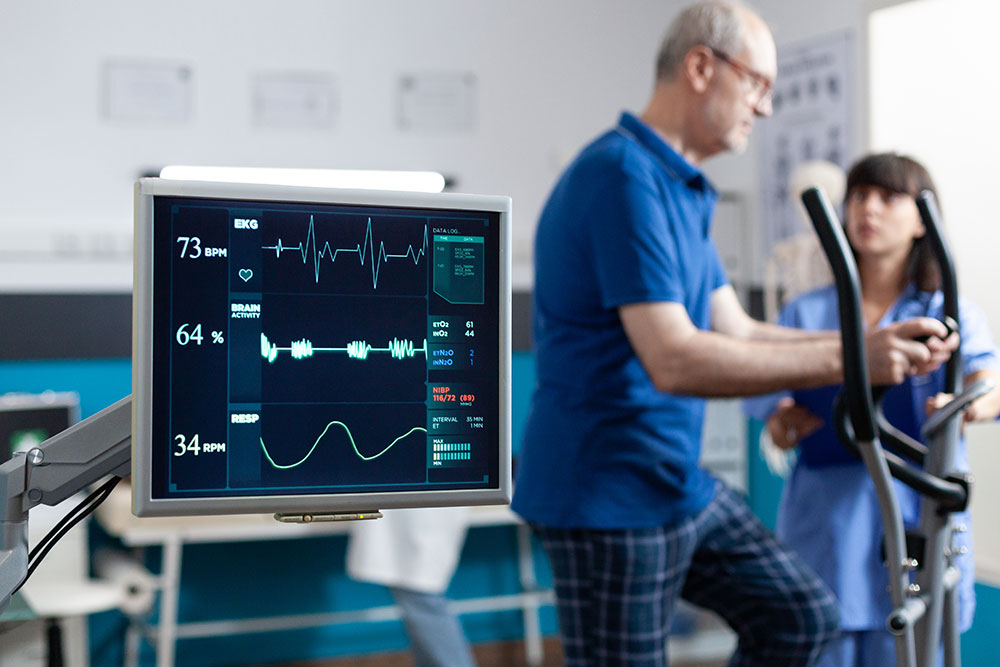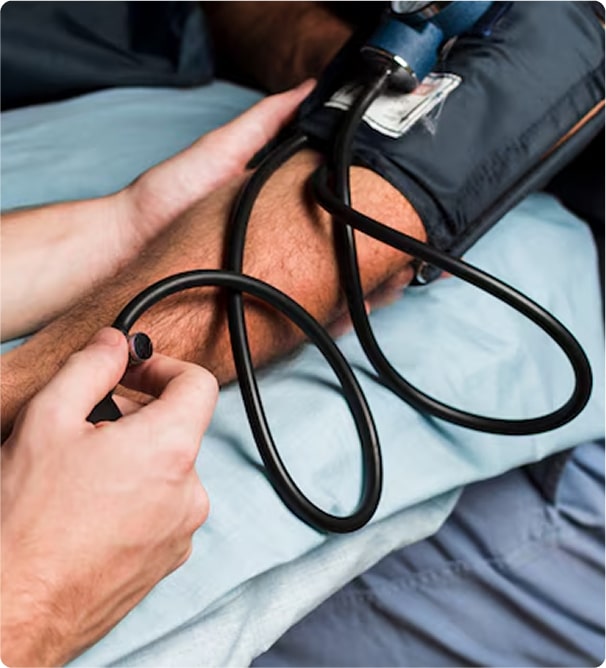
Understanding Cardiovascular Health
Cardiovascular health involves the optimal functioning of your heart and blood vessels to ensure proper circulation and oxygen delivery throughout your body. When this system is compromised, it can lead to serious conditions like heart disease, stroke, or peripheral artery disease. Our personalized approach is designed to diagnose and treat cardiovascular issues at their root cause, restoring your heart health and overall vitality.
What Causes Cardiovascular Problems?
Atherosclerosis
Plaque buildup in the arteries restricts blood flow and increases the risk of heart attack or stroke.
High Blood Pressure
Strains the heart and damages blood vessels over time.
High Cholesterol
Elevated LDL ("bad cholesterol") contributes to arterial plaque formation.
Insulin Resistance
A key factor in metabolic syndrome that promotes inflammation and vascular damage.
Chronic Inflammation
Damages the endothelium (arterial lining) and accelerates atherosclerosis.
Toxin Exposure
Heavy metals, environmental toxins, and pollutants can impair circulation and heart function.
Sedentary Lifestyle
Lack of physical activity worsens circulation and contributes to obesity.
Chronic Stress
Elevated cortisol levels from prolonged stress can increase blood pressure and disrupt heart rate variability (HRV).
How Do We Diagnose Cardiovascular Issues?
We use advanced diagnostic tools to assess your heart health, circulation, and underlying causes:
Stress Test - Heart Rate Variability (HRV)
What It Measures:
- HRV evaluates the balance between your autonomic nervous system's stress (sympathetic) and relaxation (parasympathetic) responses.
Why It’s Important:
- Low HRV indicates chronic stress, impaired cardiovascular function, and increased risk of heart disease.
How It Helps:
- Our HRV test provides insights into the impact of stress on your heart and helps guide personalized interventions.

Infrared Thermascan
What It Does:
- A non-invasive imaging tool that evaluates blood flow, circulation, and inflammation in real time.
Benefits:
- Detects areas of poor circulation or vascular dysfunction early, allowing for targeted treatment.
Doppler Ultrasound for Circulation
What It Measures:
- Assesses blood flow through arteries and veins.
Why It’s Important:
- Identifies blockages, narrowing, or reduced circulation in key blood vessels.
How It Helps:
- Provides precise information about your vascular health and any risks of peripheral artery disease.
Comprehensive Laboratory Tests
Lipid Profile:
- Measures LDL ("bad cholesterol"), HDL ("good cholesterol"), and triglycerides to evaluate plaque buildup risk.
Inflammatory Markers:
- Tests such as CRP (C-reactive protein) and homocysteine levels to assess inflammation.
Hormonal Panel:
- Evaluates thyroid function, cortisol, and sex hormones to identify imbalances contributing to cardiovascular strain.
Blood Sugar and Insulin Resistance:
- Includes fasting glucose, HbA1c, and insulin levels to assess metabolic health.
Toxicology Testing:
- Screens for heavy metals and environmental toxins that may damage vascular health.

How Do We Treat Cardiovascular Issues?
Our treatments focus on addressing the root causes of cardiovascular problems, restoring optimal circulation, and improving overall heart health.
Plaquex Therapy (Phosphatidylcholine)
What It Does:
- Plaquex is a specialized therapy using phosphatidylcholine, a natural compound found in cell membranes.
- It helps dissolve arterial plaque, improving blood flow and reversing atherosclerosis.
Benefits:
- Reduces arterial stiffness.
- Improves circulation.
- Restores vascular elasticity.
How It’s Administered:
- Delivered via intravenous therapy in a series of treatments tailored to your needs.
Chelation Therapy
What It Does:
- Chelation therapy uses agents like EDTA (Ethylenediaminetetraacetic acid) to bind and remove heavy metals and toxins from the bloodstream.
Benefits:
- Improves blood flow by reducing calcium deposits in arteries.
- Detoxifies the body and decreases oxidative stress.
- Reduces inflammation and vascular stiffness.
How It’s Administered:
- Given as an IV infusion under medical supervision.
Ozone Therapy
What It Does:
- Ozone therapy uses medical-grade ozone to improve oxygen delivery and circulation.
Benefits:
- Enhances blood oxygenation and tissue repair.
- Reduces inflammation and oxidative stress.
- Promotes improved cardiovascular function and cellular energy.
How It’s Administered:
- Delivered as an IV infusion or rectal insufflation, depending on your treatment plan.
Lifestyle and Nutritional Support for Cardiovascular Health
Nutritional Guidance
-
Heart-Healthy Diet:
Focus on anti-inflammatory, nutrient-dense foods such as:
- Omega-3-rich fatty fish (salmon, mackerel).
- Leafy greens, cruciferous vegetables, and berries.
- Healthy fats (avocado, olive oil, nuts, and seeds).
-
Personalized Plans:
Tailored meal plans based on your unique nutritional needs and metabolic profile.

Exercise Recommendations
- Incorporate low-impact aerobic activities (e.g., walking, swimming, cycling) to improve circulation.
- Include strength training 2–3 times per week to enhance vascular and muscular health.
Stress Reduction
- Practice mindfulness, yoga, or meditation to regulate stress and improve HRV.
- Ensure quality sleep (7–9 hours per night) to reduce cardiovascular strain.
Regular Follow-Up and Monitoring
- Track progress with repeated HRV tests, thermascans, and lab work.
- Adjust treatments and lifestyle interventions based on your results and goals.


Why Choose Us?
At our clinic, we combine cutting-edge diagnostic tools with personalized therapies to address cardiovascular issues at their core. From Plaquex therapy and chelation therapy to ozone therapy, we offer proven treatments designed to restore your heart health, improve circulation, and reduce your risk of cardiovascular disease.